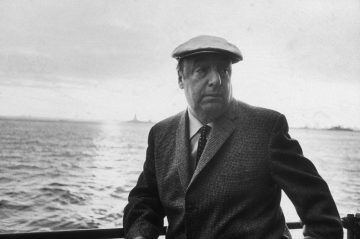Joel Whitney at the Poetry Foundation:
 In April 1949, the poet Pablo Neruda strolled onstage at the First World Congress of Partisans for Peace, in Paris, and apologized for being late. He’d been unavoidably detained, he joked. Over the preceding months, he’d lived in hiding, shuttling between a series of safe houses in South America. He had to cross the ocean on a fake passport to arrive in Europe. A photograph from that day shows him in a pinstriped suit, embraced by Picasso, who also addressed the rapt audience at Pleyel Hall. The two men look ecstatic, perhaps because of the turnaround in Neruda’s fortunes.
In April 1949, the poet Pablo Neruda strolled onstage at the First World Congress of Partisans for Peace, in Paris, and apologized for being late. He’d been unavoidably detained, he joked. Over the preceding months, he’d lived in hiding, shuttling between a series of safe houses in South America. He had to cross the ocean on a fake passport to arrive in Europe. A photograph from that day shows him in a pinstriped suit, embraced by Picasso, who also addressed the rapt audience at Pleyel Hall. The two men look ecstatic, perhaps because of the turnaround in Neruda’s fortunes.
Neruda had gone into hiding in his native Chile more than a year before. After he helped elect Gabriel González Videla as president on a radical left platform, González Videla launched a campaign of repression that included roundups of leftists and labor leaders, and violent repression of workers’ strikes. As copper prices plummeted after World War II, the Truman administration convinced González Videla that he would need the United States’ economic help and that war between the US and Russia was looming. This convinced González Videla to ban communism in Chile.
In addition to being a poet, Neruda was a senator and a new member of the Chilean Communist Party, and in response to the communist ban, he delivered a pair of dissident speeches from the senate floor. In his coup de grâce in January 1948, in a speech called “I Accuse,” Neruda read the names of incarcerated or missing Chileans and contrasted the repressions of González Videla and Truman with the “Four Freedoms” promoted by Franklin Delano Roosevelt: freedom of speech and of worship, and freedom from want and from fear.
More here.
